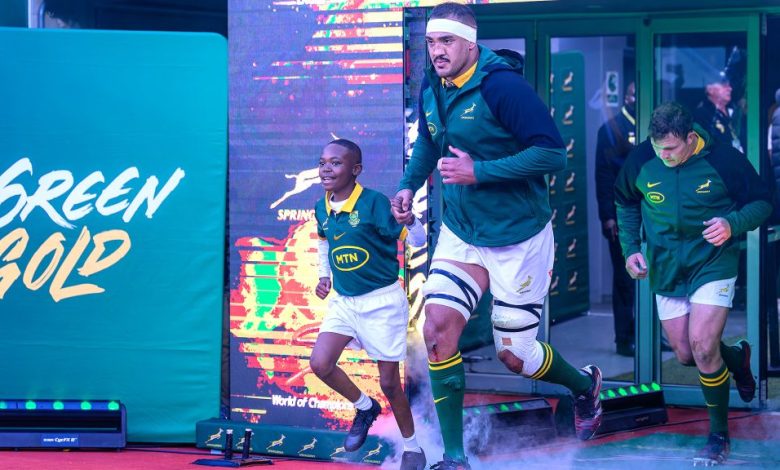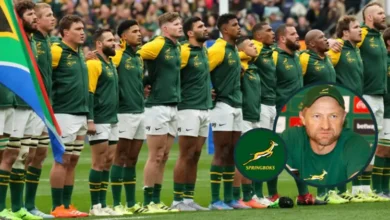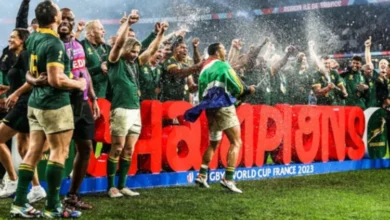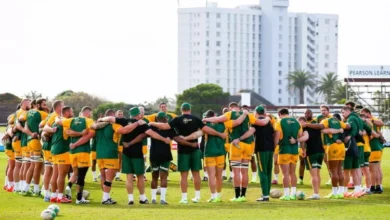THEIRS ALWAYS A BIGGER PICTURE THE UNICORN AMONG THE SPRINGBOK SET-UP

INTERVIEW: There have been 945 men who have represented the Springboks over 133 years and Salmaan Moerat is a unicorn among them.
In July last year, he became the first Muslim to captain South Africa when he led the team against Portugal in Bloemfontein. This alone marks him out as unique but his faith is merely one strand of his story.
He is also Coloured, a distinct racial and cultural group in South Africa encompassing people of mixed-race and Malay origins. There have been others. Errol Tobias and Avril Williams laid the foundation during apartheid before Chester Williams carried the flag in 1995.
Breyton Paulse, Bryan Habana and Cheslin Kolbe are among those who have dazzled out wide. Juan de Jongh, Damian Willemse and Manie Libbok have pulled strings in midfield. Few, however, have bulldozed in the tight five. Hilton Lobberts, Quinton Davids, Marvin Orie and now Moerat – reaching 2m (6ft 7in) and weighing over 115kg (18st) – stand like great sequoias in a forest of acacias.
But these forbears did not descend from rugby dynasties. The Moerat name is legend and the young Salmaan grew up in a house drenched with heritage. His father, Nazeem, represented the non-racial South African Rugby Union in the 1980s and is one of 10 family members to have received an overdue Springboks blazer in recognition of their efforts in an unequal society. Despite the injustices they endured, and despite whatever bitterness that might have hardened lesser hearts, this family rose from adversity and cultivated a passion for the oval ball.
“That has motivated me and has driven me to work that extra bit harder,” Moerat says of his family’s battles.
“For them to have enjoyed the game despite their circumstances, that is exemplary.”
Perhaps this is why, when Israeli bombs began to fall on children in Gaza in response to a Hamas terror attack in October 2023, Moerat broke the mould and weighed in on a politically divisive subject.
From any angle, along any narrative thread, there has never been a South African rugby player like Moerat.
“As a leader and a South African, it is my moral obligation to unequivocally express my support for the Palestinian people,” he wrote on his Instagram page shortly after the explosion of violence.
“I know that my voice, no matter how small, can potentially make a positive impact.” His post garnered anger but also support. Whatever your views on the geo-politics of this fractured world, this young man with so much to lose deserves credit for sticking his head above the parapet to call for justice.
From any angle, along any narrative thread, there has never been a South African rugby player like Moerat. Politically engaged, representing a minority community as well as a fabled bloodline, this behemoth with a gentle voice has not only shown leadership credentials but enough ability to break into arguably the most competitive space in world rugby.

“Not really,” he shoots back towards the end of our wide-ranging interview. “I don’t really think about it.” Like a plucky flanker on the prowl for a loose ball, I’ll have to find another way in.
We’re speaking in the build-up to the Stormers’ Champions Cup match last month against Harlequins at The Stoop in Twickenham. Our conversation starts off with the usual themes. Moerat, who captained the side in an abject display that ended in a 53-16 defeat in west London, ticked all the right boxes.
He said he was “excited to play” again after spending two months sidelined with a knee injury. He assured me that South African franchises are taking seriously what is “obviously the top [club] competition in the world”. That despite the “disjointed” preparations and travel, the Stormers, Sharks and Bulls all want to claim the main prize in Cardiff in May.
Results and performances suggest otherwise. Before this weekend’s third round of the Champions Cup, the Stormers were last in their group with two losses and the fourth-worst points difference in the tournament. Be that as it may, 2024 was still a remarkable year for Moerat. And though he’s wearing the hat of Stormers skipper, his tone instantly shifts when we turn our attention to merrier subjects.
“To put it simply, it’s been a dream year,” he muses as he looks back on a period that also saw him become a father in September, two months after he unexpectedly became the 66th man to captain the Boks. “It’s probably one of the best years of my life.”
 Back in July, a week before the Portugal Test, Moerat and the rest of the squad arrived in Bloemfontein. The team sheet for the game was pinned to the wall and next to Moerat’s name was the letter ‘C’. He assumed it was a typo.
Back in July, a week before the Portugal Test, Moerat and the rest of the squad arrived in Bloemfontein. The team sheet for the game was pinned to the wall and next to Moerat’s name was the letter ‘C’. He assumed it was a typo.
When my parents found out they were so emotional… For the first two minutes of the phone call all I did was try and calm my mom down. She was crying and couldn’t get a word out. Same with my dad.
“I thought, ‘surely this can’t be real’”, he recalls. “I had absolutely no idea. No one gave me a heads-up. It was a total surprise. For any player, you aspire to be the captain of the Springboks, but you don’t think it’s possible until it actually happens. It’s something you dream about but can’t imagine. You work hard, do your best to get there, but until you’re actually there it’s not real.
“I couldn’t tell my parents because they obviously can’t shut their mouths so I had to wait until the team announcement which was on the Wednesday. I was dying on the inside to tell them. But if I did, all of Cape Town would have known.
“When my parents found out they were so emotional. I remember that phone call. It was so sweet. For the first two minutes of the phone call all I did was try and calm my mom down. She was crying and couldn’t get a word out. Same with my dad. All he could do was say over and over again how happy he was for me. How proud he was of me. That’s what he said over and over for two minutes.”
It didn’t take long for Moerat to recognise that something much greater than personal ambition and family pride was playing out. Between training sessions, strategy meetings and back-slaps from supportive team-mates, during brief moments of quiet reflection, he processed the wider significance of this event.
“Any player of colour who plays rugby in South Africa, there is a level of responsibility,” he explains. “People look at you and hope that you can make it. Especially if your family played rugby as well, there is added responsibility and expectation on your shoulders.
“I don’t think I’ve really processed the magnitude of that moment. But when I do consider it, to be the first Muslim captain in the history of the Springboks, I’m at a loss for words. I come back to the responsibility part of it. Being the first Muslim Springbok captain, that only matters if I do a good job and perform as I should. I need to be an example and pave the way for others to follow. I can’t just be the first and last one.”
According to a 2022 survey, 89 percent of Afrikaans people identify as Christian with the Dutch Reformed Church being the largest Christian denomination in the country. During apartheid, rugby was co-opted by the socially and religiously conservative National Party and these links survived their regime. When the final whistle blew on South Africa’s 1995 World Cup victory, captain Francois Pienaar fell to his knees and led his team in prayer. Today, Kolisi, du Toit, Kolbe and other prominent players sport Christian iconography on match-days and mention their faith when receiving awards or conducting interviews.
I practice my religion openly and everyone accepts it. I’ve never felt I’ve had to hide or be under wraps, I’ve always felt confident to be who I am.
Not that Moerat has ever felt like an outsider. Though he does not partake in the post-match beers, and recognises that “rugby has a bit of a drinking culture, not just in South Africa”, he argues that the game itself acts as a unifier.
“I practice my religion openly and everyone accepts it,” he says. “I’ve never felt I’ve had to hide or be under wraps, I’ve always felt confident to be who I am. Previously with the Stormers, in my first two seasons, our team manager, Siya Kolisi and Damian Willemse, they all went with me to Mosque on a Friday. I couldn’t believe it. It was so special to see. I’ll never go around preaching or anything. It’s such a welcoming space.”
Moerat, who grew up in the wine-producing region of Paarl about 50km north-east of Cape Town, is deeply rooted in his community. Like his father and uncles, he first picked up a ball at Vineyards Rugby Club which not only serves as an initial stepping stone for so many children in the area, but also acts as a haven. “So many of these kids don’t eat otherwise,” Moerat explains. “They use the club to get by in life.”
Moerat never wanted for anything, though, as his ample size demonstrated. At 13-years-old he already weighed over 100kg and would stampede over much smaller tacklers. “It was tough getting around the field, I can tell you that. But at that age my size was a huge advantage. So rugby was maybe easier then.”
His heft soon caught the eye of scouts and he represented Boland at a provincial Under-13 tournament. From there he received a full scholarship to Paarl Boys’ High School, alma mater of 20 Springboks including Corne Krige, Thomas du Toit and Frans Malherbe. His rise was meteoric and he would go on to captain the Junior Springboks and South African Schools teams. Western Province and Stormers call-ups would follow and in July 2022, against Wales in Pretoria, he won his first Springboks cap.
He wants more, of course, but recognises that he’s competing with some of the best in the business. “We’ve been really blessed with some great depth,” he says of the other South African locks in this generational cohort. “To rub shoulders with those players, to play in the same team as them is a win for me. I just need to take my opportunities when I get them.”
But rugby is merely one strand to this unicorn’s narrative. He’s blazed a trail and smashed cultural barriers. He’s fulfilled the aspirations of his family and set an example for millions to follow. Whether he goes on to become a Springboks legend or fails to add to his nine Test appearances is almost immaterial. His legacy is secured.
“At the end of the day rugby is a part of who we are, it’s not who we are,” he adds.




